

Once reliant on manual labor, Chinese kitchenware maker ASD has now automated 80 percent of production as it has moved into the field of robotics. Its C2M line can customize every item in just 1 minute through an end-to-end unmanned process.
Finding it too difficult to make latte art? Robots can help you make a latte with the perfect tulip pattern.
With six-dimensional force control and high-precision algorithms, they showcase impressive self-learning and decision-making capabilities.
Jaka Robotics transforms robots from specialized equipment into easy-to-use tools, focusing on flexibility and intelligent collaboration. Jaka robots serve renowned brands in various industries and engage in consumer-facing services.
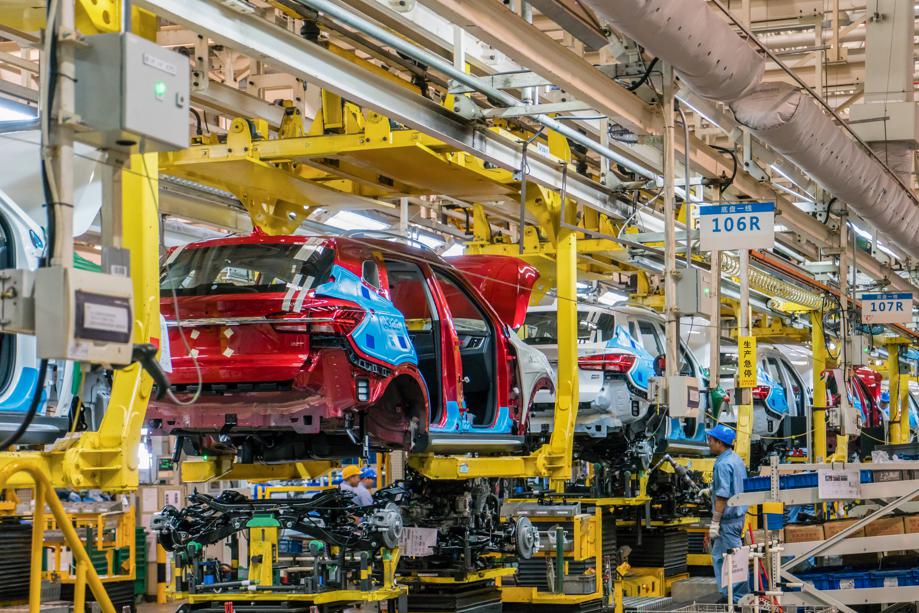
SAIC Motor Passenger Vehicle is promoting the intelligent and digital manufacturing transformation within the automotive industry, with its Lin-gang factory being at the forefront of the drive.
Operational since 2008, SAIC Motor's Lin-gang factory is one of the first highly flexible manufacturing bases in China to achieve full integration of traditional and new energy vehicle production technologies.
With a total area exceeding 1.2 million square meters, it houses both vehicle and engine manufacturing facilities.
"As a core production base of SAIC's passenger vehicle, our Lin-gang factory has undertaken the manufacturing responsibilities for numerous flagship and bestselling models," said Chen Peifeng, director of the factory.
Through deep integration of industrial big data platforms, intelligent equipment, and core business scenarios, an efficient, practical, and precise intelligent manufacturing system has been established. "By leveraging digitalization, we have significantly improved work efficiency, reduced manual errors and costs, and lessened the workload for our analysis engineers," Chen added.
"Our Lin-gang factory can now produce 43 vehicles per hour, with a new product vehicle rolling off the assembly line almost every 70 seconds," according to Chen.
Real-time data monitoring, defect analysis and vehicle tracking have streamlined operations while improving efficiency. At the Lin-gang base, statistics show that single-vehicle energy consumption decreased by 3.8 percent, single-vehicle logistics costs dropped by 6 percent and potential inventory funds reduced by 2 percent.

Moreover, through the synergy of intelligent equipment and digital platforms, the base achieved a 2 percent increase in production start rates, a 5 units per hour boost in hourly outputs, and an overall efficiency enhancement exceeding 10 percent.
Underpinning this intelligent manufacturing transformation is SAIC Motor Passenger Vehicle's development of cutting-edge technology platforms empowered by SAIC Group's investments across three core technology paths — pure electric, hybrid and hydrogen fuel cell.
"These include three vehicle technology platforms — a pure electric dedicated serialized platform, an electromechanical integrated architecture and a hydrogen-dedicated architecture," explained Xu Lu, chief operating officer of SAIC's Innovation Research and Development Institute. "They also encompass four key system technology platforms covering batteries, electric drives, powertrains and intelligent vehicle solutions."
Among them, SAIC's electric dedicated serialized platform is the first of its kind in China and can be applied to multiple vehicle varieties and levels, including sports cars, SUVs and MPVs.
One example is the MG4 EV developed based on the electric dedicated serialized platform. This model became the first Chinese electric vehicle to achieve cumulative overseas sales exceeding 140,000 units, securing its position as the bestselling compact pure electric vehicle in Europe.
"NEVs represent the future direction of automotive transformation, which SAIC must adhere to," Xu said.
In 2023, Shanghai's automotive production volume reached 2.156 million vehicles, accounting for 4.8 percent of China's total. NEV production totaled 1.287 million, representing 13.4 percent of the national total, with a production value of 387.6 billion yuan ($53.5 billion), up 32.1 percent year-on-year.

Baosteel, China's leading steel manufacturer, is optimistic about its performance and profitability this year, doubling down on its "high-end, smart and green" strategy to cater for the rising demand from electric vehicle manufacturers, according to a senior executive.
Bao Ping, chief engineer of Automotive Plate Technical Services at Baosteel Group, which is based in Shanghai, highlighted that despite the domestic steel industry's weak performance since the latter half of 2022, the company has maintained its position at the top in terms of total profit and outperformed its competitors last year.
The sector has been struggling with low downstream demand and supply pressures.
In the first quarter of 2024, Baosteel reported a total profit of 2.79 billion yuan ($385 million), maintaining its leading position in the domestic market. For the entire year of 2023, the company achieved a total profit of 15.09 billion yuan.
Baosteel's growths in international market this year have also fueled its performances, with export order volume exceeding 1.5 million metric tons in the first quarter of 2024.
The company's commitment to building a high-end, smart and green production chain plays a pivotal role in its resilience and continued profitability, according to Baosteel.
In terms of its premiumization strategy, differentiation serves as a core competitiveness, said the engineer.
This strategy is built around a specialized portfolio family that highlights automotive panels and silicon steel, alongside a range of differentiated products.
In 2023, Baosteel achieved a sales volume of 27.92 million tons within this portfolio, up 10 percent year-on-year. Sales of cold-rolled automotive sheets surpassed 9 million tons, setting a new record.
Last year, the group's research and development investment reached 5.68 percent of total revenue, with new trial products accounting for 37 percent of sales, a 4.8 percent year-on-year increase. Baosteel had 10 global product launches in 2023.
On the technological front, Baosteel continues to advance its smart production capabilities. The company introduced 15 new systems, including a digital R&D platform, smart management and smart marketing.
The smart factory initiative has seen the addition of nearly 50 new intelligent production lines and the deployment of over 200 robots, significantly enhancing production efficiency, he said.
"We have positioned 2024 as the first year for Baosteel to promote its AI strategy," said Bao. On April 26th, the company signed a cooperation agreement with Huawei, and launched its computility center.
"We will rely on cloud computing and the new generation of AI technology to boost the transformation and implementation of AI," said Bao.
Baosteel's efforts of environmental sustainability have also yielded significant achievements, said the company. The company made strides in ultra-low emission transformation last year, with its Dongshan and Baoshan bases receiving the Performance A-level Enterprise Award for 2022.
Additionally, Baosteel has completed the construction of the industry's first carbon management information system. This system enables scientific management and certification of carbon footprints and carbon assets. The company also increased its participation in green electricity trading, ranking second in the 2023 China Enterprise Green Electricity Trading Ranking.

The financial sector in Shanghai will direct more attention to technology innovation and green transitioning, which is part of the city's efforts to advance high-quality economic development, Tao Changsheng, deputy director of Shanghai Municipal Financial Regulatory Bureau said during a press conference on Wednesday.
The 32 measures introduced at the beginning of this year to facilitate the high-quality development of equity investment should be effectively implemented, as they will help to optimize the ecosystem for technology investment, said Tao.
Secondary fund, or S fund, under which investors purchase existing interests or assets from primary private equity fund investors, should seek substantial development in Shanghai as part of the efforts to nurture technology innovation. Meanwhile, tools such as technology innovation-themed special reloans, rediscounts, as well as technology-themed credit and insurance products should be given full play, he said.
Shanghai has made continued efforts to build a multi-layered capital market to nurture technology innovation. The technology-heavy STAR Market launched at the Shanghai Stock Exchange in 2019 had seen successful listing of 566 companies by the end of last year, of which 58 were Shanghai-based.
Meanwhile, the balance of loans provided to technology companies in Shanghai exceeded 1 trillion yuan ($140 billion) by the end of 2023, up 50 percent from the beginning of the year. Over 400,000 insurance policies were provided to the local technology enterprises, which was equal to 3.1 trillion yuan of risk protection, according to Tao.
The green finance service platform launched at the beginning of the year will see its functions further optimized to facilitate the city's low-carbon transformation, he said.
By the end of 2023, the balance of green loans rendered by Shanghai-based financial institutions both in renminbi and foreign currencies reached 1.2 trillion yuan.
The city's ambition in giving a bigger role to the financial sector is built on its ever improving business environment and the maturity of financial infrastructure, according to Tao.
As a home to 1,771 licensed financial institutions, Shanghai has attracted nearly 200 foreign asset managers, accounting for nearly 30 percent of the country's total. More than 500,000 financial professionals are now working in the city.
The total transaction value of various financial trading venues in Shanghai jumped 15.6 percent year-on-year to exceed 866 trillion yuan in the first quarter of 2024. The first-quarter added value of the city's financial industry grew 5.1 percent year-on-year to about 209.7 billion yuan, according to the municipal financial regulator.
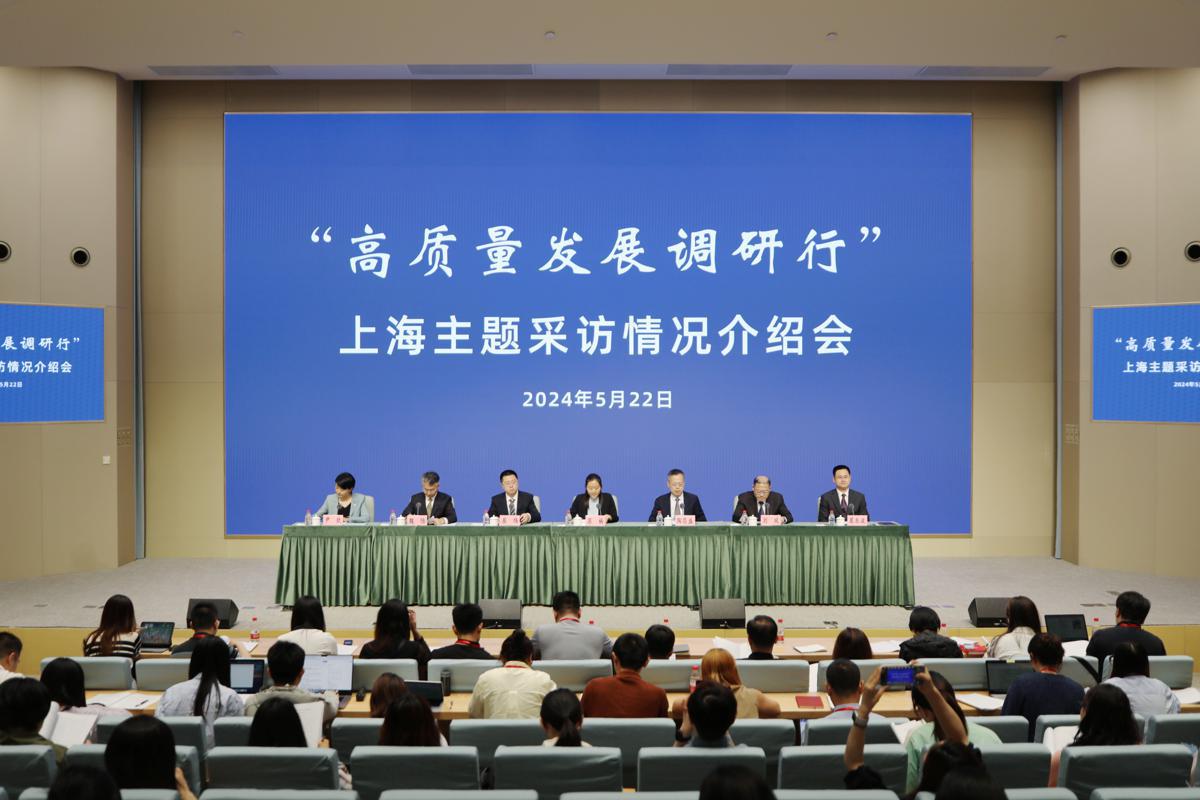
Technology innovation has been one major highlight of Shanghai's high-quality economic development, embracing approximately 370 newly registered technology companies every day in 2023, according to local officials.
The data was released by Qu Wei, deputy director of the Science and Technology Commission of Shanghai Municipality, during a press conference on Wednesday.
Shanghai was home to over 24,000 high-tech companies by the end of last year. The value of officially recognized technology contracts reached in the city spiked 21.1 percent year-on-year to 485 billion yuan ($67 billion) in 2023, said Qu.
Shanghai has also stepped up its efforts to nurture new quality productive forces. The added value of strategic emerging industries grew by 6.9 percent year-on-year in 2023, accounting for 24.8 percent of Shanghai's 4.72-trillion-yuan GDP. In specific, the combined industrial value of integrated circuit, biomedicine and artificial intelligence amounted to 1.6 trillion yuan last year, said Qu.
The city's total research and development expenditure accounted for 4.4 percent of its annual GDP in 2023, and 10 percent of that expenditure was directed to basic researches. The overall fiscal expenditure for technology development surged 36.7 percent year-on-year to nearly 53 billion yuan, of which 26.5 billion yuan came from the municipal level fiscal budget.
According to the report issued by the World Intellectual Property Organization in late September, the Shanghai-Suzhou cluster ranked fifth among the 100 monitored clusters across the world, ascending one place from the 2022 ranking and hitting a record high. This has also reflected Shanghai's progress in terms of overall technology innovation capability, said Qu.

Journalists are set to get a close-up view of Guangdong's high-quality development as the province has not only leveraged its traditional strengths such as foreign trade and manufacturing, but also fostered productive forces in talent, technologies and innovation.
"We expect journalists will experience the vibrant momentum of Guangdong's high-quality development and produce more exemplary works that vividly reflect the province's strategies, measures and proactive explorations in advancing high-quality development," said Chen Jianwen, head of the publicity department of the Guangdong Provincial Committee of the Communist Party of China.
Chen made the remarks at a kickoff event on Tuesday, preceding the start of the province's 2024 "High-Quality Development Research Tour", during which over 110 journalists from central and provincial media outlets will embark on a seven-day trip to Guangzhou, Shenzhen, Dongguan, Foshan, Zhaoqing and Zhuhai, with the aim of decrypting Guangdong's strategy to boost growth.
In response to the United States' economic and technological sanctions, China has been emphasizing the importance of high-quality development and "new quality productive forces" to promote advanced manufacturing and green development, creating strategic high-tech industry clusters, next-generation information and communications technologies, artificial intelligence, biotechnology, new energy, new materials and advanced manufacturing equipment.
Under the initiative, Guangdong's achievements have underscored its leadership — the province's GDP reached 13.5 trillion yuan ($1.87 trillion), securing its status as the top province for a 35th consecutive year. Guangdong also led the nation in research and development, with R&D spending accounting for 3.4 percent of regional GDP.
"In the pursuit of cultivating new quality productive forces, Guangdong remains steadfast in fortifying the resilience and security standards of its industrial and supply chains," said Zou Yongbing, chief economist of Guangdong's department of industry and information technology. This approach aims to safeguard the autonomy, controllability, safety and reliability of the province's industrial ecosystem, he said.
In line with that pursuit, Lin Yi, deputy head of Shenzhen's industry and information technology bureau, reaffirmed on Tuesday Shenzhen's commitment to support the development of native HarmonyOS apps.
HarmonyOS, or Hongmeng in Chinese, is an open-source operating system developed by Chinese telecom giant Huawei for various devices and scenarios, including intelligent screens, tablets, wearables and cars.
"Shenzhen is leading the way as the first city in China to promote development of the HarmonyOS native application at the municipal government level," Lin said, adding that this effort will strengthen Shenzhen's reputation as a top software city, an innovation hub and a major export center in China.
"Meanwhile, by doing so, Shenzhen also aims to build a model ecosystem for the HarmonyOS operating system, thereby boosting the global competitiveness of Chinese tech companies," Lin added.
Li Yihui contributed to this story.
Ahn Tae Min, the chairman of CJ (Shenyang) Biotech Co, a subsidiary of South Korean conglomerate CJ Group, recently expressed confidence in the advantageous investment climate of the city, and Liaoning province generally, pointing to the company's rapid growth there in recent years. He also reiterated his strong belief in the greater Chinese market.
CJ Group, a Fortune 500 company, was founded in 1953 as a globalized lifestyle and culture enterprise. Its subsidiary in China, CJ (Shenyang) Biotech, produces a line of food and feed additives through a fermentation process, starting with corn as raw material.
The Chinese branch was established in 2011 with an initial investment of 3 billion yuan ($414 million) and has become one of the largest overseas investment projects of the CJ Group.
"Liaoning has exceptional geographic advantages and plentiful grain resources. The business environment is supported by strong industrial foundations and diverse industrial sectors," Ahn said.
"Moreover, it possesses abundant scientific and educational resources, including prestigious universities, research institutions and a skilled workforce. These advantages serve as strong motivation and instill confidence in enterprises to achieve high-quality development."
China's rapidly growing food market offers significant opportunities for CJ Group, enabling it to achieve significant success in food and a number of other sectors, he said.
The importance of the Chinese market to the global strategy of multinational companies is reflected in the commitment of CJ Group, he added. Moreover, China's key position in global innovation and the promotion of new technology aligns with the goals of multinationals.
In recent years, Liaoning province has been actively committed to improving its openness, aiming to make itself a high-quality node of the Belt and Road Initiative and a strategic pivot for the country's opening-up to the east and north.
The implementation of a series of open-door policies has brought more opportunities and confidence to foreign enterprises, making Liaoning a popular region for foreign investment. Numerous major foreign investment projects have settled there, including SK Group of South Korea, French tire company Michelin and BMW Brilliance Automotive, a joint venture of BMW Group and Brilliance China Automotive Holdings.
Wu Jun, Party secretary of Shenbei New District in Shenyang, said that the participation of prominent agricultural enterprises such as Wellhope has stimulated investment and progress in the agricultural industry.
"In addition, we have devised a set of strategies to attract investment and set up a platform for enterprise innovation and technological advancement, utilizing top-notch resources from institutions such as Shenyang Agricultural University to promote high-quality growth," Wu said.
CJ Group's decision to set up a base in China, and Liaoning in particular, was based on the province's excellent investment environment, the attractiveness of its open-door policy and the key role that China is playing in the global innovation and technology revolution. Together, these factors drive CJ Group's favorable view of the Chinese market and its willingness to work hand in hand with China, the company said.
Zhang Huirong, general manager of the milk powder division of Liaoning Yuexiu Huishan Holding Co, also in the food business, said, "The development of the dairy industry needs to scale up, and that requires good mountains, good water and fertile land. Therefore, we are deeply plowing Shenyang and striving to make the dairy industry bigger and stronger."
Ahn said: "CJ will continue to combine our unique strengths with Liaoning's geographical advantages to support the province's high-quality development and achieve high quality in our company as well. Additionally, we will actively encourage Korean entrepreneurs to focus on Liaoning and invest in the region, taking advantage of opportunities for new areas of growth."
Ye Xinnan contributed to the story.

Northeast China's Liaoning province is on a fast track to solidifying its status as an investment hub by drawing growing attention from a number of foreign investors bullish on its market potential.
Through implementing a series of policies conducive to foreign investment and bringing forth more opportunities for foreign companies, the province has become home to the commercial presence of industry leaders such as South Korea's SK Group, France's Michelin and BMW Brilliance Automotive — a joint venture between Germany's BMW Group and Brilliance China Automotive Holdings Ltd.

By the end of 2023, Liaoning had accumulated a total of $245.5 billion in foreign investment. The province's goods have been exported to over 200 countries and regions worldwide, among which the export of electric passenger cars, lithium batteries and solar cells all enjoyed substantial year-on-year surges.
Ahn Tae Min, chairman of CJ (Shenyang) Biotech Co Ltd — South Korean firm CJ Group's China branch in Shenyang, capital of Liaoning — expressed optimism about the city's favorable investment environment. He highlighted the company's rapid expansion in Liaoning in recent years, and expressed strong confidence in the Chinese market.
CJ (Shenyang) Biotech produces food additive nucleotides and feed additive amino acids using corn as a raw material through bio-fermentation technology. CJ Group is a Fortune Global 500 firm founded in 1953.
CJ (Shenyang) Biotech, established in 2011, has become CJ Group's largest overseas investment project with an initial investment of 3 billion yuan ($414 million).
"Liaoning enjoys superior geographical advantages and abundant grain resources. The province provides a favorable business environment with solid industrial foundations and comprehensive industrial categories. In addition, it boasts abundant scientific and educational resources, with numerous renowned universities, research institutions and a large number of high-quality industrial workers. These advantages provide ample motivation and confidence for enterprises to achieve high-quality development," Ahn said.
Wu Jun, Party secretary of Shenbei New Area in Shenyang, said the presence of leading agricultural enterprises like Wellhope has driven investment and development in the agricultural sector.
"Meanwhile, we have formulated a series of investment attraction policies and established a platform for enterprise innovation and technological empowerment, leveraging high-quality resources from institutions such as Shenyang Agricultural University to foster high-quality development," Wu said.
Ahn said: "CJ will further integrate our own advantages with Liaoning's geographical advantages to contribute to the province's high-quality development and realize the high-quality development of our company. At the same time, we will actively encourage South Korean entrepreneurs to pay attention to Liaoning and invest in Liaoning, seizing opportunities for new growth points."
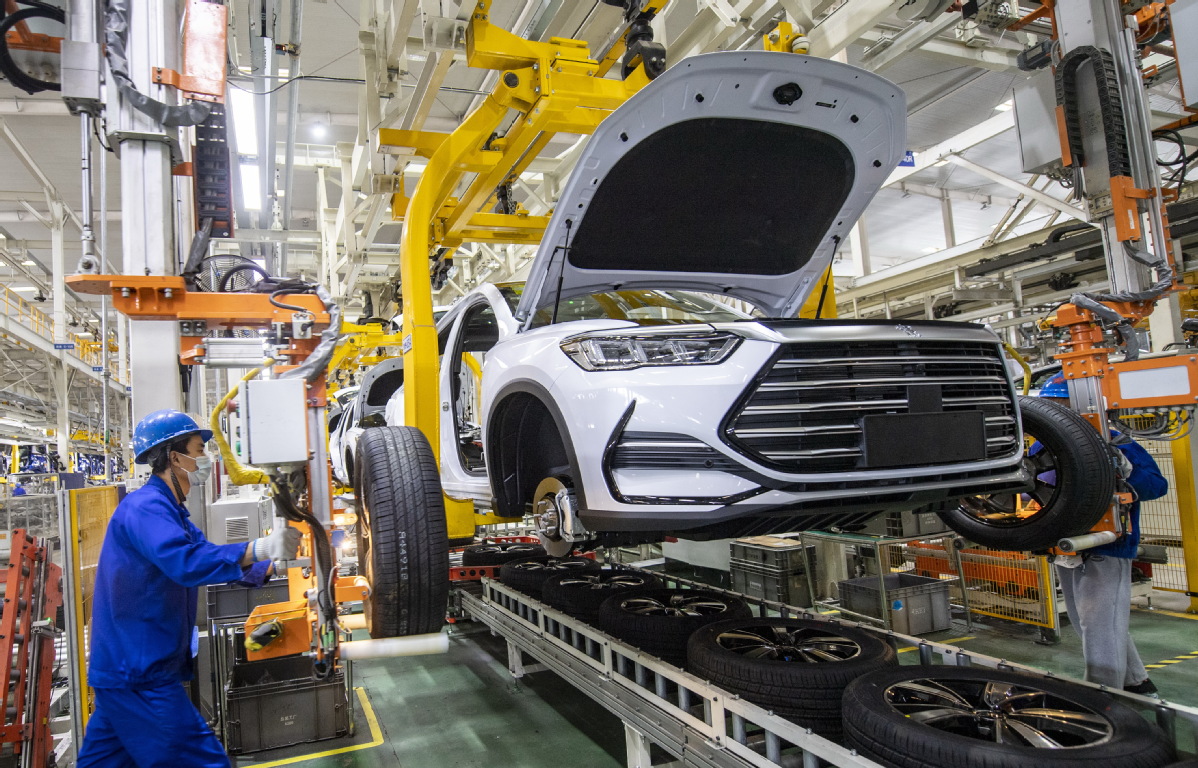
Jiangsu, a developed province and economic powerhouse in East China, will better coordinate investment, consumption and foreign trade to promote its economic growth and strive to make a greater contribution to the overall development of the country, said top provincial officials.
Xu Kunlin, governor of Jiangsu, said at a news conference held by the State Council Information Office on Tuesday that the province has set an economic growth target of over 5 percent this year, but it will make more efforts to achieve even better results.
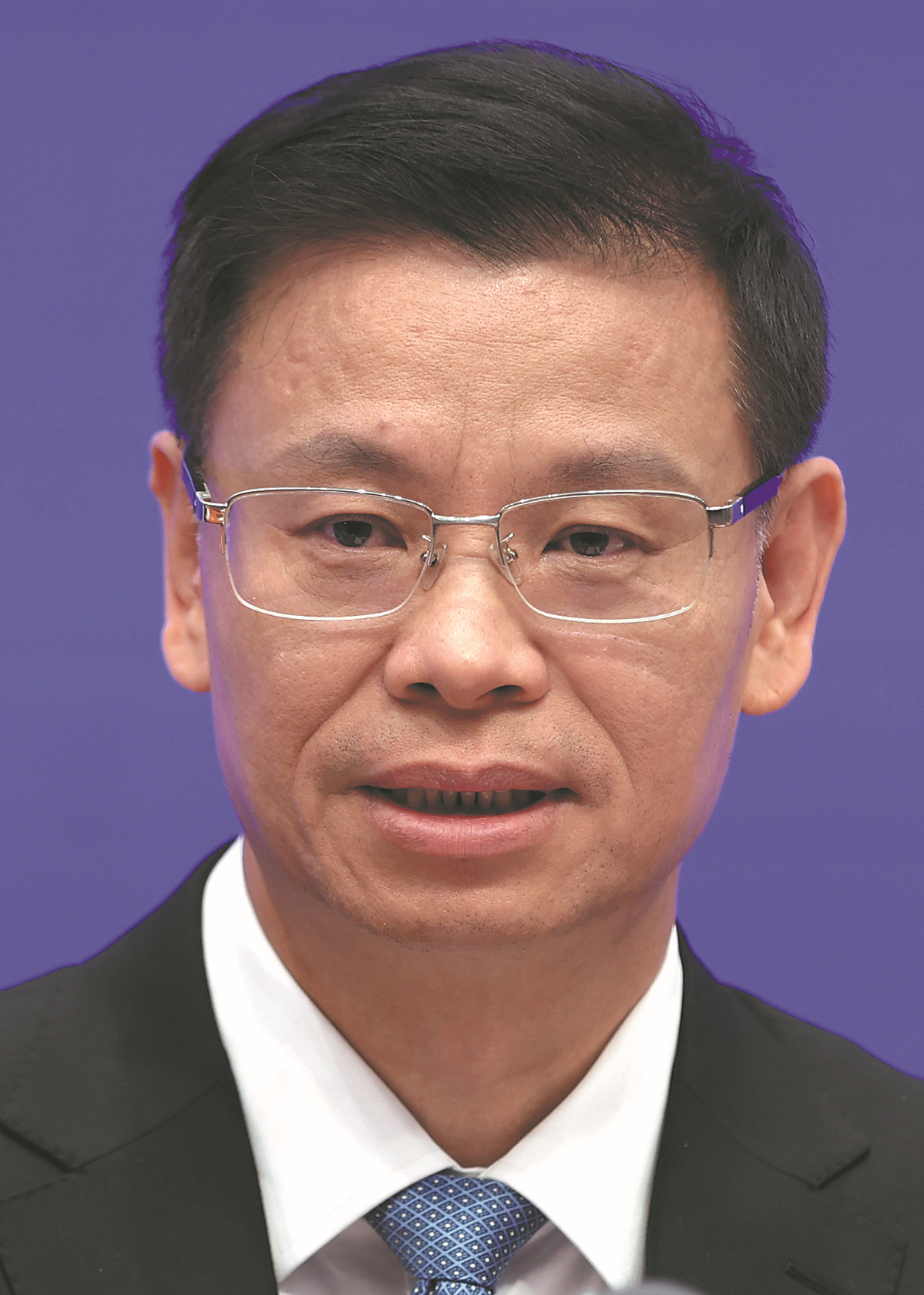
"In 2023, Jiangsu's GDP grew 5.8 percent year-on-year, 0.6 percentage point higher than the national average," said Xu. "The key priority is to combine the implementation of the strategy to expand domestic demand with supply-side structural reforms."
Last year, Jiangsu's GDP reached 12.82 trillion yuan ($1.77 trillion), compared with 6.51 trillion yuan in 2014, with 13 cities ranking among the top 100 nationwide and five reaching an economic aggregate of above 1 trillion yuan.
According to Xu, investment accounted for 34.1 percent of Jiangsu's economic growth in 2023. A notable positive development is the turnaround in the growth rate of private investment, which had been at a low level since June 2022.
The province's private investment increased 5.6 percent in the first two months of the year, signaling strengthened confidence in development and investment across society, said Xu.
In addition, the value related to equipment renewal in Jiangsu this year has reached 900 billion yuan. In response, the province has implemented a policy offering financial interest subsidies for manufacturing industry loans.
While consumer spending acts as a key driver of economic growth, Jiangsu has dedicated funds to encourage the use of environmentally friendly and energy-efficient household appliances, and this has yielded positive outcomes over the past two years.
In the first three months of this year, the province held more than 2,600 consumer promotion events. Its cultural and tourism sector also thrived, with consumer spending representing 11.2 percent of the national total during this year's Spring Festival holiday, securing its top position in the country.
According to Xu, the value of demand for replacing old consumer goods with new ones is projected to reach approximately 70 billion yuan this year, and the province is actively drawing up supportive policies and guidelines for the replacement of automobiles, household appliances and home furnishings to stimulate consumer spending.
He also stressed the importance of strengthening foreign trade, adding that Jiangsu's imports and exports fell short of expectations in the first three quarters of last year. However, the province has implemented more targeted measures to stabilize its international market share in response.
In the fourth quarter of last year, Jiangsu's foreign trade saw three consecutive months of positive growth, with a 7.3 percent increase in the quarter, surpassing the national average by 5.7 percentage points.
An action plan was also devised last year to promote the high-quality development of cross-border e-commerce, resulting in 13.4 percent growth in 2023.
This year, Jiangsu aims to establish more than 110 provincial-level cross-border e-commerce industrial parks and 15 cross-border e-commerce industry clusters. It facilitated the merger and reorganization of five provincial trade enterprises, with a combined import and export volume exceeding $11 billion. The reorganized enterprises are currently expanding their global trade layout, aiming for further trade growth.
"Our goal is to achieve positive growth in foreign trade this year," said Xu. The province's foreign trade increased 13.4 percent year-on-year in the first two months of 2024, 4.7 percentage points higher than the national average.
Fang Wei, vice-governor of Jiangsu, said that the province's freight trains have 24 operational routes connecting China, Europe and Central Asia, while its cargo ships reach major ports globally, with over 26,000 cargo ships entering Jiangsu annually.
"This has established Jiangsu as a key transit hub for trade with Japan, South Korea, Southeast Asian countries, Central Asia and Europe," he said, adding that Jiangsu's total domestic and international trade volume is nearly 10 trillion yuan.
"The province has actively fostered international relations, boasting friendly ties with 363 cities in 67 countries and regions, ranking first nationwide," said Fang. "Jiangsu also stands out as a region with substantial foreign investment, hosting 43,000 foreign-invested enterprises, including over 400 Fortune Global 500 companies."
Fang said that foreign-invested enterprises have established 395 regional headquarters and functional institutions, as well as 293 research and development centers in Jiangsu.
New quality productive forces and further opening-up will serve as two major engines for Shanghai's high-quality economic growth, said officials of the Shanghai municipal government.
They made their comments during a news conference held by the State Council Information Office on Thursday.
"While continued efforts will be made to expand Shanghai's economy, the city will be dedicated to the construction of a modern industrial system and the development of new quality productive forces," Shanghai Mayor Gong Zheng said at the news conference. "Comprehensive reform and opening-up will be deepened at a higher level to better achieve high-quality development, both at the economic and social levels."
While three pioneering industries — integrated circuits, biomedicine and artificial intelligence — saw their combined industrial value reaching 1.6 trillion yuan ($221 billion) last year, they should aim for more breakthroughs to ease bottlenecks and further improve the resilience and safety of industrial and supply chains, said Gong.
The digital economy, green and low-carbon transition, the metaverse and intelligent devices will be the four areas in which Shanghai will strive for the upper hand amid market competition. The city also plans to be an early mover in the future-oriented healthcare, smart technologies, energy, space and new materials sectors, according to Gong.
"We will continue to step up mapping in disruptive and cutting-edge technologies while striving for breakthroughs in key technologies," he said. Technology mapping is used by companies for long-term planning in order to achieve specific objectives.
Traditional industries that make up a large part of Shanghai's economy, such as carmaking, steel and chemicals, should aim for digital and green transition by integrating with new technologies and novel business models, Gong said. In this way, traditional industries can also grow into new quality productive forces, the mayor added.
Research and development accounted for about 4.4 percent of Shanghai's GDP of 4.72 trillion yuan last year, while the figure was 4.2 percent in 2022.
To further nurture innovation in technology, which is crucial to the development of new quality productive forces, Shanghai will attach greater importance to basic research, giving full play to the 80-strong national level, high-end scientific research platforms and better supporting the 24,000 high-tech companies in the city.
A basic research pioneering zone is in the pipeline, Gong said.
In addition, more social capital will be invested in hard technology companies during their preliminary development stage, the mayor said.
As an international financial hub, Shanghai was home to 548 foreign licensed financial institutions last year. The city's total financial market trading value hit a new record of 3.37 quadrillion yuan, the highest in the world.
Shanghai will deepen opening-up in the financial sector by completing its market system, enriching product supply, optimizing the institution's mechanism and improving financial infrastructure, said Gong.
As home to 956 regional headquarters of multinational companies, Shanghai will further open up to attract more foreign investment, said Hua Yuan, Shanghai's vice-mayor, adding that foreign companies will be encouraged to invest in the sectors of green development, digital transformation and technology innovation in Shanghai.
While Shanghai remained the first in the world for twenty-foot-equivalent unit container throughput for the 14th consecutive year, with 49.16 million TEUs in 2023, efforts will be made to develop high-end services such as shipping insurance and maritime arbitration, said Hua.
By aligning with the world's high-standard economic and trade rules, Shanghai will further improve its business environment and advance institutional opening-up, said Hua.
Pudong New Area, where comprehensive reform pilot programs have been conducted, will play a leading role in institutional opening-up, said Gu Jun, director of the Shanghai Municipal Development and Reform Commission.
Market entry, especially in telecommunications and medical sectors, will be relaxed in an orderly manner. Six new regulations will be formulated in Pudong by the end of the year to advance reform in free trade accounts, commercial mediation and corporate compliance, he added.
To attract talent from home and abroad, which is integral to Shanghai's high-quality development, the city will roll out more policies to facilitate their household registration, housing, entry and exit into the country, said Gong.
Specifically, Shanghai has come up with more convenient payment methods for expatriates, covering both mobile and card payments. It also launched at the beginning of this year the International Services Shanghai portal to provide up-to-date information and policy guidance for expatriates working or traveling in the city, said Hua.
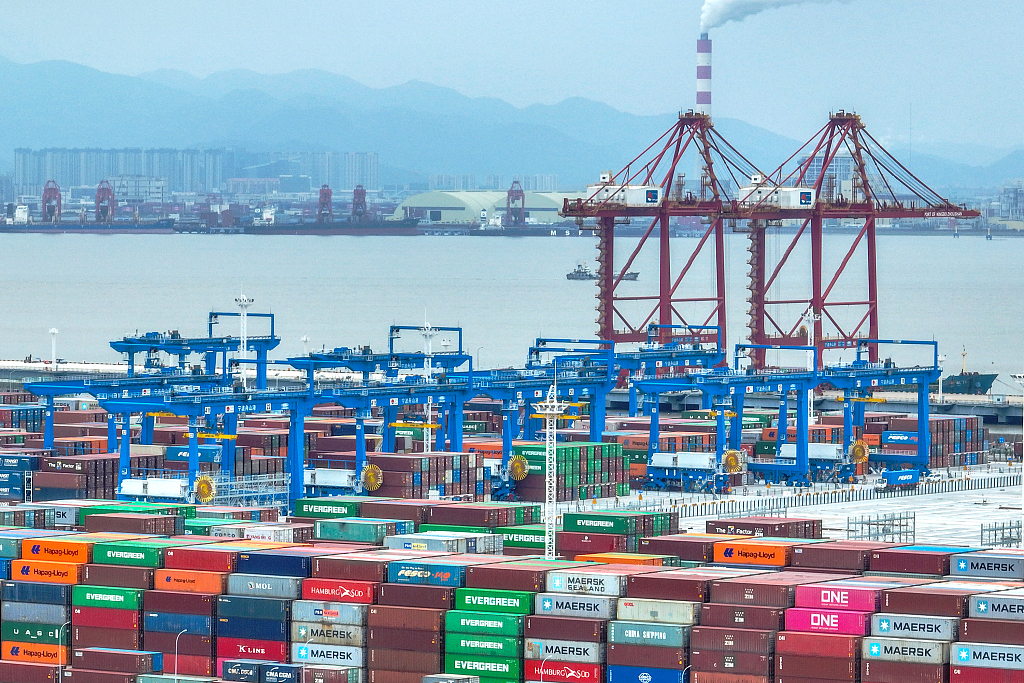
Zhejiang will continue to ramp up efforts to enhance its business environment in order to attract more foreign investment and encourage privately owned businesses amid measures to promote local high-quality development, authorities said.
The province will continue to foster a favorable business environment while accelerating the formation of new mechanisms for trade, investment and cooperation, said Lu Shan, vice-governor of Zhejiang, during a news conference held on Wednesday by the State Council Information Office.
"We are committed to creating a first-class business environment characterized by marketization and internationalization, and based on the rule of law," he said. "Through regularly hosting roundtable meetings for foreign enterprises, we aim to address challenges in production and operation, ensuring smooth progress of foreign investment."
Wang Hao, governor of Zhejiang, said that in 2023, the total number of market entities in the province reached 10.4 million, while the total foreign trade volume amounted to 4.9 trillion yuan ($678 billion).
Zhejiang's export volume, totaling 3.57 trillion yuan, accounted for 15 percent of the national share, ranking among the leading provincial-level contributors to the growth of national imports and exports, he said.
The province's efforts have already won support from many big brands and companies.
Following Zhejiang's global investment promotion campaign, which aims to attract a group of high-quality and innovative foreign investment projects, Saudi Aramco — one of the world's largest oil exporters — signed a 24.6 billion yuan investment agreement with Rongsheng Petrochemical Co last year to further expand its presence in the province.
The deal represents the continued growth of Aramco's downstream presence in Zhejiang, as the oil giant eyes greater investment and cooperation opportunities amid China's high-quality development, Aramco said.
Li Shuirong, chairman of Rongsheng, said the agreement also signifies an important step forward in the Zhejiang-based company's internationalization strategy.
Wang Lining, director of the oil market department of the Economics and Technology Research Institute of China National Petroleum Corp, said the nation has been encouraging participation of foreign companies in the refining sector and has attracted investment by several such companies over the past few years.
Large domestic private enterprises, including Rongsheng, have played a key role in China's advanced refining capacity in recent years, he said.
Wang Hao said that while Zhejiang looks forward to more foreign investment through continuous policy measures, it will also continuously foster a favorable business environment and maintain the sustainable growth of privately or individually owned businesses in the province.
"We will vigorously promote innovation and deepen reforms, in order to inject new vitality into the regional economy and create more new business opportunities," he added.
zhengxin@chinadaily.com.cn
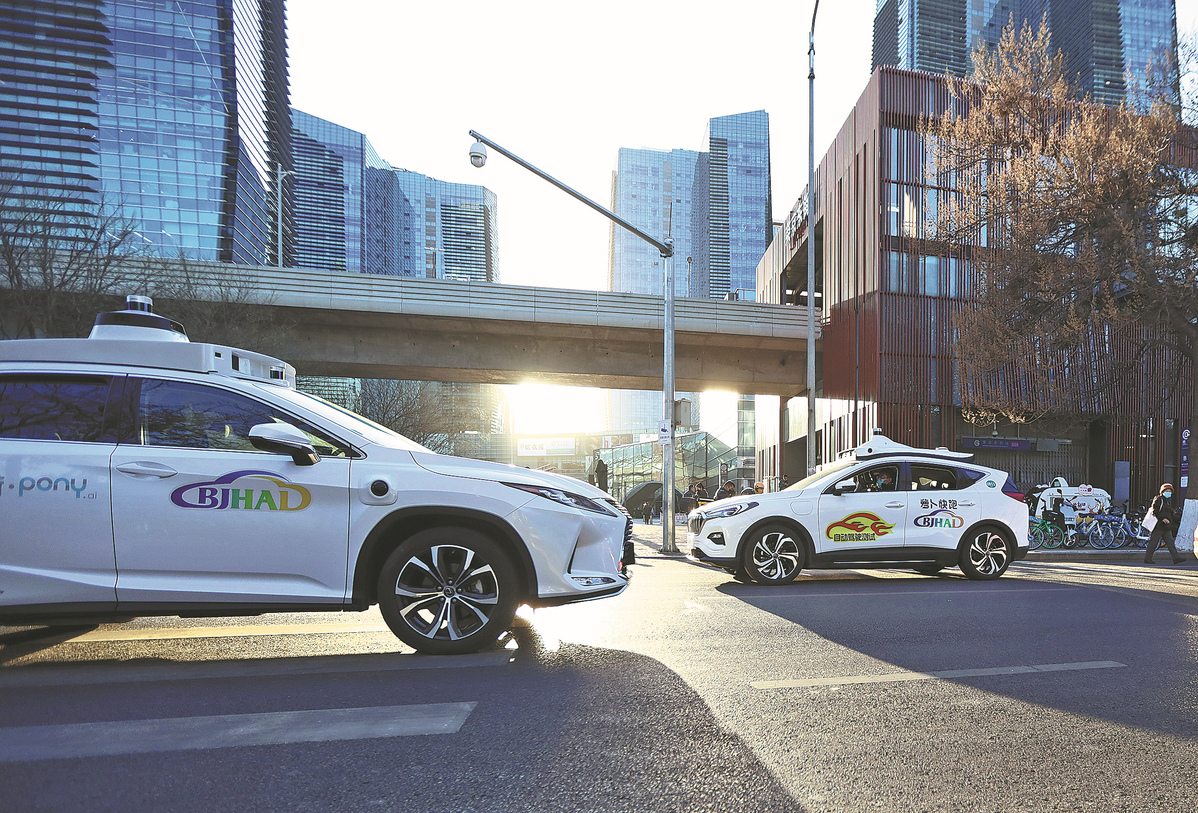
BEIJING -- Beijing municipality will focus on building itself into a major international sci-tech innovation center and leverage its strategic role as the national capital to develop new quality productive forces in a drive to enhance the city's high-quality development, local authorities said on Tuesday.
In recent years, Beijing's efforts have achieved remarkable results. The city has topped the list of "Nature Index -- Science Cities" for eight consecutive years, ranking among the most innovative cities in the world, the city's mayor Yin Yong said at a press conference.
The volume of technology contract transactions in Beijing exceeded 850 billion yuan (about $119.74 billion) in 2023, with an average of 337 technology enterprises established each day.
In the face of a new round of global technological and industrial changes, the capital will continue to make efforts to improve its sci-tech research capabilities, deepen the reform of the sci-tech system, and strengthen the cultivation and introduction of talent, Yin said.
"We will concentrate on breaking through key core technologies and aim at the commanding heights of industrial development in more than 20 directions, such as future information, health, manufacturing, energy, materials and space," Yin added.
The metropolis has upgraded its urban management over the years, especially in the field of high-level autonomous driving. Three years ago, it took the lead in adopting the vehicle-road collaboration technology to promote the development of autonomous driving technology, according to Yin.
The area for autonomous driving in Beijing will expand from 160 square kilometers to 600 square kilometers this year, and the application of the technology will be accessible at five major railway stations as well as Beijing Daxing International Airport and Beijing Capital International Airport.
"We hope to attract more leading enterprises and R&D institutions to the field of autonomous driving, and to improve the upstream and downstream supporting facilities of the industrial chain. We welcome all kinds of capital, especially long-term capital, to increase investment in this field," Yin said.
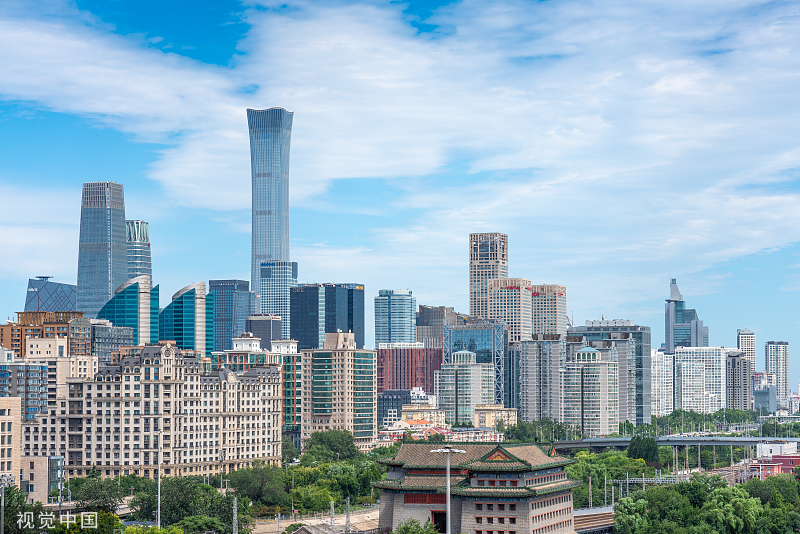
BEIJING - Beijing municipality will continue to leverage its strategic role as the national capital and speed up high-quality development, local authorities said on Tuesday.
Over the years, Beijing has made substantial progress on technological innovation, improving the business environment and urban governance, among other areas, said the city's mayor Yin Yong at a press conference held by the State Council Information Office.
Adhering to its general development plan, efforts will be made to relieve Beijing of functions non-essential to its role as the national capital, and support the building of Xiong'an New Area, while advancing the high-quality development of the Beijing Municipal Administrative Center.
Steps will be taken to strengthen the metropolis' role as an international center for innovation in science and technology, and advance green and low-carbon development by optimizing the energy structure and scaling up the green electricity supply to 25 percent of the city's total.
Beijing will also accelerate the construction of the Integrated National Demonstration Zone for Opening up the Services Sector and the China (Beijing) Pilot Free Trade Zone, and will roll out more preferential policies for enterprises.
More will be done to ensure and improve people's well-being, Yin said, adding that the city will step up transportation management, aiming to increase the proportion of green transport in its central districts to 75 percent.

Beijing will continue to enhance its business environment to attract investment by introducing a series of foreigner-friendly measures and strengthen international exchanges, amid its comprehensive efforts to promote high-quality development.
Yin Yong, mayor of Beijing, made the statement at a news conference held by the State Council Information Office on Tuesday morning.
"We know that creating a favorable business environment is the greatest support for enterprises," he said. "Beijing has taken various measures and listened to the opinions and suggestions from enterprises."
For instance, during the past weekend, the city's senior officials visited companies such as PricewaterhouseCoopers, Meituan and Alibaba in Beijing to better know their needs.
On Thursday, Beijing will hold an international meeting at which the mayor will engage in face-to-face discussions with leaders of over a dozen internationally renowned multinational companies, listening to their insights on Beijing's business environment.
"We deeply understand that the business environment can always be improved, and there is no 'best', only 'better'," Yin said.
According to the city government, in recent years, Beijing has implemented over 1,200 reform measures to improve the business environment, reducing procedures by over 60 percent.
"In the next step, we will focus on enhancing the sense of satisfaction for enterprises, striving to build the 'Beijing Service' brand for the business sector," he added.
Beijing's efforts have won support from many big brands and companies.
Zhou Xing from PricewaterhouseCoopers said that since its first permanent representative office was set up in Beijing in 1981, it has expanded investments in the capital to now have more than 5,500 employees in four offices, according to Beijing Daily.
"We look forward to more enterprises, entrepreneurs and investors coming to China, to Beijing, to truly experience the current multidimensional development," Zhou said, adding that the company will continue to play its role as a bridge, promoting the convergence of various domestic and international standards and assisting in promoting the sustainable development of Beijing.
Furthermore, Xia Linmao, the city's executive vice-mayor, said at the news conference that Beijing will make greater efforts to address the concerns of foreign friends.
For instance, in payment methods, Beijing will focus on enhancing the convenience of the use of cash, foreign bank cards and electronic payments, he said.
Also, in areas with many foreign residents such as Chaoyang district and the sub city-center in Tongzhou district, efforts will be made to accelerate the construction of international schools and hospitals.
"Additionally, the process for handling mobile phone cards both online and offline will be further improved for foreigners," he added.
At both Beijing Capital International Airport and Daxing International Airport, the authorities have established service centers for overseas visitors' payments, and plan to expand the construction of the service centers to enable visitors to enjoy more integrated services such as tourism, transportation and telecommunications upon their arrival.
In another development, Yu Yingjie, Party secretary of the Beijing Municipal Education Commission, introduced a coming national-level event — the 2024 Zhongguancun Forum, which will be held for the first time at its newly constructed permanent venue from April 25 to 29.
"UNESCO will participate as a supporting unit at the forum for the first time", Yu said. "The forum will be even more internationalized, with more fruitful results."
So far, 28 events have been organized at the forum, focusing on widely discussed topics such as large-scale model applications, cell and gene therapy, and quantum computing.
